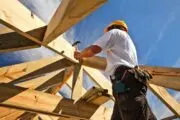
In a move to tackle the ongoing housing crisis, the Ontario government says it has hiked taxes on foreign real estate speculation.
The province announced this week that it has increased the Non-Resident Speculation Tax (NRST) rate to 20 per cent, and will be effective as of March 30th on all agreements of purchase and sale entered into on or after that date. The increased tax will also be applicable provincewide, which the provincial government says will bolster efforts to dissuade non-resident investors from speculating on Ontario’s housing market.
Until the recent announcement, the NRST rate was set at 15 per cent and only applied to homes bought in Ontario’s Greater Golden Horseshoe region by foreign nationals — those who are not citizens or permanent residents of Canada — foreign corporations and taxable trustees.
“Young families, seniors and workers are desperate for housing that meets their needs. But a lack of supply and rising costs have put the dream of home ownership out of reach for too many families in the province,” said Peter Bethlenfalvy, Ontario’s Minister of Finance, in a press release.
“That is why our government is adopting the most comprehensive Non-Resident Speculation Tax in the country. Our government is working to increase supply and help keep costs low for Ontario families and homebuyers, not foreign speculators looking to turn a quick profit,” he added.
Rebates for Canadian permanent residents and related exemptions will be available to eligible newcomers, the province said, and NRST relief eligibility will be focused on newcomers who are committed to “laying down roots in the province long-term.” For purchase agreements entered into on or after March 30th, rebates will no longer be made available to international students and foreign nationals working in Ontario.
In its announcement, the provincial government said that it is working with municipalities that are looking to implement a Vacant Home Tax, which has been introduced in the City of Toronto and is being considered in other communities. Vancouver introduced a one per cent empty homes tax in 2017 on properties that are unoccupied for six months of the year.
The NRST tax increase precedes the unveiling of the next components of Ontario’s housing supply action plan, which the province says is designed to build more homes.
“Our government is taking action to bring home ownership within reach for more hardworking Ontario families, and I look forward to sharing our plan in the near future,” said Steve Clark, Minister of Municipal Affairs and Housing.
“There is no silver bullet to solving the housing crisis. Addressing the housing supply crisis is a long-term strategy that requires long-term commitment and coordination with our partners and between all levels of government,” he added.






